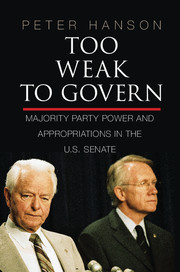3 - The First Wave (1979–1987)
Published online by Cambridge University Press: 05 November 2014
Summary
I turn next to a set of case studies analyzing how the characteristics of the Senate majority party affect its management of the annual appropriations bills. The value of case studies is that they can show whether theories and the findings of quantitative studies meaningfully fit the messy reality of the political world. I evaluate the reasons why the Senate majority party abandons the regular order and judge their consistency with the expectations of the theory using events on the floor of the Senate and the perceptions of important actors as evidence. I do not expect that the weakness of the Senate majority party will be the only factor influencing the creation of omnibus spending bills, but its effect should be plainly visible. I also make a more general assessment of the spirit behind the majority’s actions to assess whether the majority party abandons the regular order when it goes on the offense to pursue its policy goals or as a defensive strategy to ensure the passage of the budget when it has difficulty managing the floor.
This chapter analyzes the first term of President Ronald Reagan from 1981 to 1984 when omnibus bills first became a common way to adopt the budget. The evidence from this crucial period fits the expectations of the limited influence theory well. The Republican majority was weak because it had a narrow margin of control and was ideologically divided. Social issues such as abortion and school prayer divided the party. Republican-led filibusters on appropriations bills were common and disrupted the party’s ability to adopt regular appropriations bills. The majority’s response was to transform temporary continuing resolutions (CRs) into full-year substitutes for regular spending bills it was unable to pass. When these full-year substitutes themselves became routine, the omnibus appropriations bill was born. The evidence suggests that the packages helped the majority party to reduce amendments and ensure passage of the budget but did not lead to systematic policy wins for the party. All of these packages attracted bipartisan support, although at times minority opposition rose above 50 percent of the minority party.
- Type
- Chapter
- Information
- Too Weak to GovernMajority Party Power and Appropriations in the U.S. Senate, pp. 70 - 98Publisher: Cambridge University PressPrint publication year: 2014



